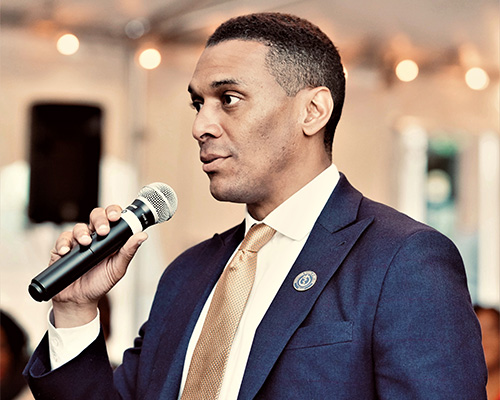Alumni Spotlight: Carl V. Hill, MPH ‘98
 Carl V. Hill
Carl V. Hill
Carl V. Hill, MPH ‘98, PhD, has gone from a member of Morehouse School of Medicine’s inaugural Master of Public Health class to serving as director of the Office of Special Populations for the National Institute on Aging, a position he has held since October 2013. Before that, Dr. Hill spent almost nine years with the Nation Institute on Child Health and Human Development and four years with the Centers for Disease Control and Prevention. He earned his bachelor’s degree from Morehouse College and PhD from the University of Michigan School of Public Health. Hill was recently honored as the 2019 Morehouse School of Medicine Distinguished Alumnus.
Dr. Hill recently took a few minutes to reflect on his MSM experience and the impact it has had on his life.
-
What attracted you to Morehouse School of Medicine and becoming a member of the inaugural Master of Public Health degree program?
I’m really drawn to Morehouse School of Medicine’s mission of increasing the diversity of the health professional and scientific workforce. In being part of the inaugural Master of Public Health degree program class, I was attracted to being part of the first MPH program at an HBCU and helping Drs. Bill Jenkins, Noble Maseru, Patricia Rodney, Zara Sadler and Dan Blumenthal – against very huge odds - make impact in diversifying the public health workforce.
I’ve been many places on my career path in public health, but none as organic and special as that first year in 1995 when our MPH Program consisted of just a few students and faculty. Our vision was unified with a spirt that was ambitious and hopeful. It was unforgettable. -
What has driven you on your career path? Why did choose the places you have worked and the issues you have tackled?
I’ve been driven by the core concepts that Morehouse School of Medicine represents: social justice, diversity, and equity. Whether it's been at the CDC to help with the creation of the Tuskegee Center for Bioethics in Research and Healthcare, training with the University of Michigan’s Program for Research on Black Americans or working with NIH’s National Center (now Institute) for Minority Health and Health Disparities, I’ve been driven by health disparities research and initiatives that diversify the health professional and scientific workforce.
-
In what ways has MSM and your connection to the alumni network, supported your career and influenced many of your professional decisions?
I’ve tried to represent MSM’s mission as a graduate and create collaborative opportunities with alumni. Along the way, I’ve collaborated with fellow alumni to develop panel sessions focused on diversity and worked specifically with other alumni to highlight opportunities for health disparities research. I’m certainly looking forward to becoming more involved in MSMNAA to help bring attention to our need for diversity in clinical trial participation and to stimulate disparities research for important health outcomes like Alzheimer’s Disease.
-
When and how did you become involved with MSM National Alumni Association? What would you tell fellow alumni, particularly younger members, about the importance of participating in the MSMNAA?
I’ve been part of the MSM National Alumni Association for some time, being encouraged by Ms. Carrie Dumas to stay connected and to give back. When we reflect on the impact of an institution that was created to provide resources and opportunities for those underrepresented and disproportionately affected, it immediately becomes priority that Morehouse School of Medicine continues to thrive in accomplishing its mission. As alumni, we should be first in giving back because of all that we gained from being trained at MSM.
-
You were part of the inaugural MPH class at MSM. This year we launched the Physician Assistant Studies program. What advice would you give to this latest inaugural group of pioneers?
It's important to recognize this opportunity to push MSM’s diversity reach in another critical health professions area. Our newest pioneers should focus on rigorous training and producing graduates that represent MSM and the new Physician Assistant Studies program extremely well.
-
What excites you about MSM’s future and the MSMNAA movement to get more alumni involved?
I’m excited about the foundation that MSM can provide for the achievement of health equity in the United States: Health professional and scientific training that demands students to consider principles of ethics and fairness; Rigorous health disparities research that explores pathways among various levels of analysis to understand and address the health of disproportionately affected populations; and a strong MSMNAA that uses our alumni network to sustain MSM’s foundation, while also teaming up to influence policy and conduct research that seeks to achieve equity.
